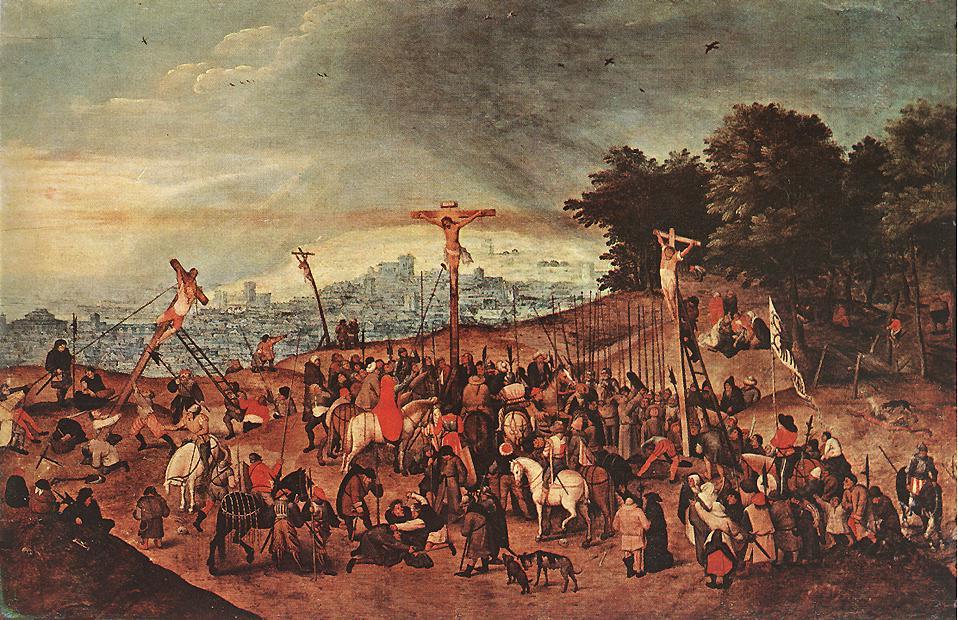When Jesus said “My God, my God, why hast thou forsaken me?”, this was not some sort of statement of defeat, but Jesus was simply referring to Psalm 22. The Tanakh did not have chapter numbers at that time, so the first sentence of a chapter was used to refer to it.
[Mat 27:46 KJV] 46 And about the ninth hour Jesus cried with a loud voice, saying, Eli, Eli, lama sabachthani? that is to say, My God, my God, why hast thou forsaken me? [Psa 22:1 KJV] My God, my God, why hast thou forsaken me? [why art thou so] far from helping me, [and from] the words of my roaring?Why did he point to Psalm 22? Because he was stating he was fulfilling the passages in Psalm 22.
Enemies mocking and shaking their heads.
[Psa 22:7 KJV] 7 All they that see me laugh me to scorn: they shoot out the lip, they shake the head, [saying], [Mar 15:29 KJV] 29 And they that passed by railed on him, wagging their heads, and saying, Ah, thou that destroyest the temple, and buildest [it] in three days,Enemies sarcasticly seeing if God would deliver him.
[Psa 22:8 KJV] 8 He trusted on the LORD [that] he would deliver him: let him deliver him, seeing he delighted in him. [Mat 27:43 KJV] 43 He trusted in God; let him deliver him now, if he will have him: for he said, I am the Son of God.Dividing up his clothes and casting lots for it.
[Psa 22:18 KJV] 18 They part my garments among them, and cast lots upon my vesture. [Luk 23:34 KJV] 34 Then said Jesus, Father, forgive them; for they know not what they do. And they parted his raiment, and cast lots.His hands and feet were pierced.
[Psa 22:16 KJV] 16 For dogs have compassed me: the assembly of the wicked have inclosed me: they pierced my hands and my feet. [Jhn 19:37 KJV] 37 And again another scripture saith, They shall look on him whom they pierced.The Jewish counter-missionaries claim “they pierced my hands and my feet” should be “like a lion my hands and my feet”. At issue is a single letter in a Hebrew word. וראכ results in pierced. יראכ is like a lion. The difference is a vav and a yod.
One argument pierced makes more sense is it makes more linguistic sense. “Like a lion my hands and my feet” makes no grammatical sense and it also doesn’t make any logical sense. It requires adding additional words not found in the Hebrew to even make it remotely make sense. For example, Gerald Sigal adds “they are gnawing at” to the passage.
it is to be read: “Like a lion [they are gnawing at] my hands and my feet.” This is the most plausible interpretation of the text.
https://jewsforjudaism.org/knowledge/ar … ike-a-lion
Though I would dispute this even makes any logical sense. Why would lions gnaw at someone’s hands and feet?
Jews point to the Masoretic text to support their view.
“In the Masoretic text, the verse reads: ‘For dogs have encircled me, an evil congregation surrounded me; like a lion my hands and my feet.'”
https://torahresource.com/psalm-2216-like-lion-pierced/
However, the earliest Masoretic text is the late 9th century.
The Masoretic work enjoyed an absolute monopoly for 600 years, and experts have been astonished at the fidelity of the earliest printed version (late 15th century) to the earliest surviving codices (late 9th century).
https://www.britannica.com/topic/Masoretic-text
In the Dead Sea Scrolls, which dates back to the first century, it has a vav, so it affirms it should be translated pierced.
Scraps from a scroll containing some of the Psalms were discovered at Nachal Hever, and one scrap contained the line from Psalm 22:16 with the word in question well in view. Though the writing on the scrap was faint, under magnification it was easy to see and decipher. The word clearly ended in a vav not a yod, and was therefore a 3rd person plural verb: “they dug” or “they pierced.”
https://torahresource.com/psalm-2216-like-lion-pierced/
This is also confirmed in this source:
http://dssenglishbible.com/psalms%2022.htm
It is more likely an earlier Hebrew text (Dead Sea Scrolls) is less corrupt than a late Hebrew source (Masoretic).
Further coorrobation is in the Septuagint. It uses oryssō, which means “dig, burrow”
https://www.blueletterbible.org/lxx/psa … onc_500016
And even if one uses the Masoretic, it can still be translated to match the crucifixion account.
(AGB)
Dogs surround me; a band of evildoers has encompassed me; like a lion, my hands and feet are paralysed.
(CEB)
Dogs surround me; a pack of evil people circle me like a lion — oh, my poor hands and feet.
(LEB)
Because dogs have surrounded me; a gang of evildoers has encircled me. Like the lion they are at my hands and my feet.
(LOT)
(22:17) For dogs have encompassed me; the assembly of the wicked have enclosed me: like lions they threaten my hands and my feet.
(NET)
Yes, wild dogs surround me – a gang of evil men crowd around me; like a lion they pin my hands and feet.
(TPT)
They have pierced my hands and my feet. Like a pack of wild dogs they tear at me, swirling around me with their hatred. They gather around me like lions to pin my hands and feet.
So, from the evidence of the DSS and the Septuagint, pierced is a better translation than like a lion. But even if a Bible uses the Masoretic, all these translations are still compatible with Jesus being crucified.
https://debatingchristianity.com/forum/viewtopic.php?p=1135863#p1135863
